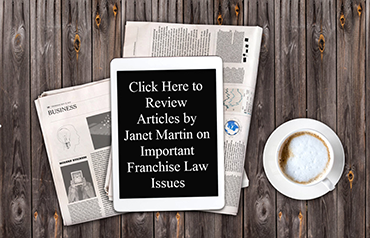What are the Exhibits or Addendum to the Franchise Agreement
The Franchise Disclosure Document (FDD) must contain ALL potential contracts you will or may be required to sign. This includes the Franchise Agreement, as well as many other exhibits or addenda to your franchise agreement, each with specific requirements and legal obligations.
The most common Exhibit is the Personal Guarantee, which is uniformly required by Franchisors when the Franchisee is going to be a corporation or LLC. These guarantees are generally overbroad and oftentimes apply to transactions outside the franchise agreement obligations, and risk all the individuals personal assets basically forever. While most franchisors don’t want to negotiate, there are ways a franchisee can lessen the potential liability of a personal guarantee. DO NOT assume it is a take it or leave it proposition.
There may be a separate a Confidentiality Agreement, and/or a Non-Competition Agreement. While keeping the confidentiality of the system is understandable, some of the post-term non-competition provisions, are not generally NOT enforceable in California. Your FDD should contain a “California Addendum” that points out contradiction. (Some other states have laws similar to California’s). The specific language of the agreement should be closely analyzed to understand what exactly is your obligation post-tem.
Telephone Transfer-this is to give the franchisor the right to take over your telephone number in the event of termination.
ACH (Bank Authorization form)-This gives the Franchisor your permission to take any and all monies out of your bank account for franchise agreement (and related agreements) obligations. This is very dangerous but almost always required. What the franchisee needs to know, is this revocable by the franchisee at any time, so if there is a dispute about the next big withdraw from the franchisee’s bank the franchisee does have the power to revoke it. This action however may place the franchisee in default of the franchise agreement, so a franchisee will need to be prepared to follow the dispute resolution terms at that point.
Conditional Lease Assignment-this is a set of terms the Franchisor wants the Landlord to include as part of the lease, or sign separately, agreeing to let the franchisor take over the lease in the event of termination of the franchise agreement. This is between the Franchisor and the landlord, and the franchisee generally has no control over those discussions.
Franchisee certification-this can be named differently but generally it is a set of questions the Franchisee answers as part of the signing of the franchise agreement process, or just before. Basically it is representations the Franchisor did not violate any franchise laws, and is generally used as a defense by Franchisors in any legal action whereby the franchisee assets something that is contradicted by the questions. It is important for the franchisee to answer the questions accurately and not just check the boxes the franchisee thinks the franchisor wants.
Other contracts-there may be a variety of other contracts concerning software licensing, Food distribution, or other service oriented contracts, each with their own set of obligations, limitations, and even separate dispute resolution and governing law provisions.
Do not enter into a franchise agreement lightly after talking to the Franchisor; the Franchisor is NOT going to tell you the risks, pitfalls, and down sides of what is in your franchise agreement ad these exhibits, other than “it is standard stuff”. You need an experienced franchise attorney to help guide you through these documents.


